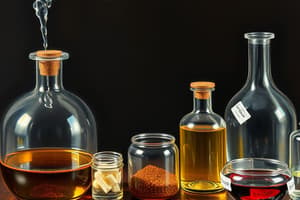Podcast
Questions and Answers
Which type of matter is a compound?
Which type of matter is a compound?
- Heterogeneous mixture
- Pure substance (correct)
- Homogeneous mixture
- Element
What kind of mixture is a suspension?
What kind of mixture is a suspension?
- Pure substance
- Heterogeneous (correct)
- Colloid
- Homogeneous
Which statement about elements is correct?
Which statement about elements is correct?
- Elements are made up of atoms that are all different. (correct)
- Elements can be separated by physical means.
- There are about 90 elements found only in laboratories.
- Only naturally occurring elements are stable.
What distinguishes a compound from a heterogeneous mixture?
What distinguishes a compound from a heterogeneous mixture?
How are suspensions and colloids different?
How are suspensions and colloids different?
What is the defining characteristic of a substance?
What is the defining characteristic of a substance?
How is an element different from a compound?
How is an element different from a compound?
Which statement about elements is accurate?
Which statement about elements is accurate?
What distinguishes a homogeneous mixture from a compound?
What distinguishes a homogeneous mixture from a compound?
Which type of mixture contains particles that never settle?
Which type of mixture contains particles that never settle?
How do compounds differ from mixtures?
How do compounds differ from mixtures?
What makes an element unique?
What makes an element unique?
In what way do heterogeneous mixtures differ from compounds?
In what way do heterogeneous mixtures differ from compounds?
Why are suspensions classified as heterogeneous mixtures?
Why are suspensions classified as heterogeneous mixtures?
Flashcards are hidden until you start studying
Study Notes
Types of Matter
- Compounds consist of two or more elements chemically bonded together in fixed proportions.
- Elements are pure substances that cannot be broken down into simpler substances by chemical means.
Mixtures and Suspensions
- Suspensions are heterogeneous mixtures containing large particles that can settle over time.
- Mixtures can be homogeneous (uniform composition) or heterogeneous (distinct, separate components).
Characteristics of Elements
- An accurate statement about elements is that they are the fundamental building blocks of matter, each defined by the number of protons in their nucleus.
- Elements differ from compounds in that compounds are made up of multiple types of atoms, while elements consist of a single type of atom.
Distinguishing Compounds and Mixtures
- A compound is a pure substance with a definite composition, while a heterogeneous mixture does not have uniform composition and consists of different substances in varying proportions.
- A homogeneous mixture has a consistent composition throughout; it is not chemically bonded like a compound.
Differences between Suspensions and Colloids
- Suspensions contain larger particles that may settle out, while colloids have smaller particles that remain dispersed and do not settle.
Defining Characteristics of Substances
- A defining characteristic of a substance is that it has a consistent and uniform composition and properties.
Unique Nature of Elements
- Each element is unique due to its atomic structure, specifically the number of protons, which determines its chemical properties.
Heterogeneous Mixtures vs Compounds
- Heterogeneous mixtures have visibly different substances or phases, while compounds are uniformly composed of their constituent elements.
Behavior of Particles in Mixtures
- Mixtures classified as suspensions have particles that are large enough to eventually settle out when left undisturbed.
Studying That Suits You
Use AI to generate personalized quizzes and flashcards to suit your learning preferences.




